Although I have other pieces ready, I wanted to follow up my Dumb Shit Fitness Professionals Say #1. And I wanted to do that by showing what being helpful is. To whit, I’ve redone that stupid “Eating like an Asshole” thing to be correct and useful rather than a piece of trash. So now let me show you the real reasons you’re not losing weight.
Here it is, probably the closest to an Infographic I’ll ever make.
Click it to make it bigger for saving. There’s a full size version at the end of the article.
Now let me examine the real reasons you’re not losing weight.
Table of Contents
Reasons You’re Not Losing Weight: Myths
First let me look at some of the common myths to explain why you’re not losing weight. This can’t even begin to be comprehensive so I’ve just chosen some of the more representative ones.
Insulin
The idea that insulin was the cause of obesity or could prevent weight loss can be traced to Gary Taubes. Who, after 5 years of “dedicated research” drew a stupid conclusion that people still believe to this day. That conclusion being that insulin levels, rather than calorie intake caused obesity. Tim Noakes, who used to be a forward thinking physiologist, is a more recent convert to the cult. Which is simply sad.
The idea here is that high insulin causes obesity and/or just lowering insulin will cause fat loss/prevent obesity. Therefore, goes the logic, just stop eating carbohydrates to lower insulin and obesity is solved. The idea isn’t even new, only the nonsensical rationale.
And it’s wrong. Modulating insulin levels from the low to high range just doesn’t impact on much. There is also the fact that protein raises insulin just fine and we know it doesn’t cause weight gain. And factually fat can store itself without raising insulin at all. The whole idea is crap.
Related: What Is the Glycemic Index?
Meticulous work by Kevin Hall has shown the insulin hypothesis to be garbage. Quite in fact, at least one of his studies was funded by a low carb group called NuSi. It still found a negative result which must have been a real kick in the nuts.
Not that it matters. Taubes has stated that “No evidence will change my mind.” That’s not science. That’s gurudom. Because research apparently only mattered until he had his first book deal. And then nothing would change his mind.
Which isn’t to say that for people with insulin resistance, lowered carbohydrate diets may not be better in many ways. But there’s no magic effect on body weight outside of any impact on food intake.
Eating Carbohydrates
This is just an extension of the previous topic. Since carbohydrates raise insulin, so the logic goes, eating carbohydrates either causes weight gain or prevents weight loss. And it’s untrue. In a calorie controlled situation, high and low-carbohydrate diets cause about the same weight loss.
Some will point out that bodyweight drops rapidly when carbohydrates are removed from the diet. And that it goes up similarly when they are reintroduced. But this is just water going on and off of the body. It doesn’t mean anything.
Related: What Are Carbohydrates?
Eating Sugar
An extension of the previous topic, people who will eat carbohydrates in their diet think of sugar as the devil. There are various arguments here but they usually go back to insulin. Which is funny because the insulin response to sugar is lower than to many “good” carbohydrates. It’s glycemic index is lower than potatoes.
And there is nothing inherently evil about sugar in this regard. Quite in fact, years ago I stated that if someone got sufficient protein, they could eat nothing but table sugar and lose fat. Imagine the response.
Except that people have done this. So we had one guy do The Twinkie Diet and another who did the Ice Cream Diet. And they both worked fine in terms of causing weight loss. Am I saying to do this? No, of course not. It simply makes the point: sugar intake does not explain why you’re not losing weight.
Sugar cannot magically prevent weight loss. Quite in fact, when calories are controlled, replacing some complex carbs with sugar has no impact on weight loss.
Eating Some Specific Food
Just another extension of the above. Sometimes rather than broad categories of foods, people think a specific food is why they’re not losing weight. Usually it’s their own pet trouble food. Or one that they stopped eating at some point and finally lost weight. Aha, they conclude, that food stops weight loss. Except that what happened was that not eating that food made them eat less.
Gluten is a common one here and I’m sure there are a lot of these if you take the time to look. Dairy is one that gets trotted out a lot in various circles. What’s hilarious about this one is that study after study shows that dairy improves fat loss on a diet. Not only is the myth untrue, it’s completely backwards.
Not Clean Eating/Doing a Specific Magic Diet
A further extension of the above is the idea that if you’re not following some specific magic diet, you will be prevented from losing weight. Here, the perfect diet is the one that whomever you’re talking to is on.
Take your pick: clean eating, Paleo, carnivore, IF, IIFYM (not really a diet), etc. Whatever worked for them is the right diet. If you’re not losing weight, you just need to switch to their magic diet. I mean, it worked for them!
The simple fact is that this can’t be true. On any diet you name, some do great, some are ok and some fail. If there were a single correct magic diet we’d know what it is. I mean, we do: it has to have sufficient protein and create a deficit.
Beyond that, the difference in results between diets is minimal. What mostly matters is that people can adhere to it in the long term. And I was saying that over 15 years ago.
Starvation Mode
Ok, starvation mode. This one has been around for decades. The basic idea being that if you do certain things the body will go into this mode and “hoard calories and store fat.” Various ideas tend to follow from this.
One is that if you miss breakfast, your body will go into fat storing mode. This idea came out of animal research and it’s nonsense. For an animal missing a single meal is a huge deal. For humans it’s irrelevant. Also, the Intermittent Fasting data shows it’s untrue.
A similar idea is that if you don’t eat every 3 hours you go into starvation mode. Same thing, came out of animal research. In humans, meal frequency has no measurable impact on energy expenditure.
What’s even funnier about this one is that it’s actually reversed. In humans, fasting completely for 3-4 days actually RAISES metabolic rate.
Metabolic Damage
And then there is the idea of metabolic damage, that you can do permanent damage to your metabolism through extreme dieting. It’s been around for years in one form or another with entire books about “fixing it” out there.
The most recent promulgation came from Anti-Guru Guru Layne Norton who built an entire seminar circuit and got a mansion out of selling bullshit (it probably helped him move to Australia when he left his wife). He still hasn’t owned up to being wrong about it (he said he was “misled” which is just pathetic).
His argument was based on “hundreds of emails” (not science, Layne) who “reported” gaining fat on 1200 calories. Hence they had metabolic damage. And I and many others pointed out to him the roughly 50 years of data saying it was wrong. He wouldn’t budge. I’ll tell you what was going on in the second half of this piece.
Related: Is Metabolic Damage Real?
At a conceptual level, to explain starvation mode or metabolic damage, you’d have to explain how people living in food ravaged countries are all emaciated. Didn’t their bodies go into starvation mode? No, because it’s not a thing.
Which isn’t to say that there aren’t endless metabolic adaptations to fat loss. Energy expenditure absolutely goes down, appetite goes up and there’s more. But that’s not damage. And it’s not storage mode. And none of the adaptations can cause someone to GAIN FAT if they are in a deficit.
Slow Metabolism
The idea of a slow metabolism causing someone to gain weight or as an explanation for why you’re not losing weight is decades old. It still gets thrown around as an explanation. And, well, it’s not true.
Outside of some rather severe disease states, the idea of a low metabolic rate just isn’t a thing. Invariably when someone online claims such and goes and gets their metabolic rate measured, it’s stock normal.
Quite in fact, as people’s bodyweight (well lean body mass) goes up, so does their resting metabolic rate. It’s simple, to a point, bigger people burn more calories.
Certainly there is variability at any given bodyweight as you can see in the graph. For any given weight there may be relativly higher or lower values. LBM only explains a majority of BMR, not all of it. Even here variations in BMR don’t predict weight gain.
Which isn’t to say that total daily energy expenditure may not be lower in overweight individuals due to lower activity levels. But this is not a “slow metabolism” so much as low activity. Usually the issue is in Non-Exercise Activity Thermogenesis with NEAT being low.
There are a couple of reasons for this. One is that heavier individuals often don’t move around much. No, I’m not playing the “gluttony card”. It’s just physics. But part of it is that there is a biological driver on activity levels, it lives in the dopamine system. And it’s just as likely that a deficit here predisposes individuals to move less, allowing them to gain weight.
But by and large there is no such thing as a slow metabolism.
Low Thyroid
Which brings me to the idea of people having low thyroid hormone levels. This one must date back to the 50’s or 60’s when nobody knew nothin’ about nothin’. I think they sort of assumed that low thyroid caused obesity and they handed out thyroid drugs like candy. Which caused all kinds of fun tachycardia and muscle loss.
Funfact: DNP is safer than thyroid medications.
Which isn’t to say that some people aren’t truly hypothyroidal in a clinical sense. That still can’t stop weight loss although it makes it harder. Energy expenditure is down and water retention is common which can mask weight loss. But people with true hypothyroidism have lots of other symptoms. Factually, in most cases this is not an explanation.
Endless Other Myths
And that is seriously just touching the surface of the topic. People repeat the endless myths and they refuse to die. So of course people are confused.
Especially when lazy ass “Fitness Professionals” tell them to “Do their own research” rather than pointing them to better information. Because they’d rather be judgmental and call them an asshole for not knowing what they can’t know.
Reasons You’re not Losing Weight: Realities
With some of the common myths covered, let’s move to the realities of the topic. Some actual reasons you’re not losing weight. Again, I can’t be comprehensive and will only hit on the big ones.
Underestimating Your Food Intake
In all honesty, this is usually the explanation for why people can’t lose weight. Simply, they are eating more than they think. Research shows that people may underestimate their food intake by 20-50% at least. That is, what they think they are eating is 20-50% less than what they are actually eating.
Literally everybody misreports their food intake. Lean people, overweight people, active people, inactive people are all terrible at estimating their food intake. Even registered dieticians are bad at it.
Among other things, this is why epidemiology is crap. The food reports are garbage. Because everybody sucks at this.
And in a weight loss context, this means that people who think they are only eating 1200 calories may be eating 1800. And that’s why they can’t lose weight. There are all kinds of TV shows where they find someone who says they have a broken, slow metabolism. Who say they don’t eat very much. And they add up the daily food and it’s like 8,000 calories or more. People are terrible at his.
The modern world has simply broken our concept of portions and calorie amounts. They will do these on the street things and ask people how many calories in a large pizza. People will say 400 when it’s more like 4000.
And, going back to metabolic damage, THIS is why those people reporting gaining fat on low calories were doing nothing of the sort. They were simply underreporting their food intake. And we told Layne this. And he went to the guru well of ad hominems and bullshit to avoid the truth.
Hilariously Layne is now sharing stuff on Instagram about how you’re not losing weight because you’re underreporting your food intake. But when metabolic damage seminars were on the line, science didn’t matter. It only matters now so he can pretend he didn’t sell people lies for 5 years to buy a mansion (and afford moving to Australia). Isn’t that right?
Overestimating Your Calorie Expenditure
Coming right out of the above is the fact that most people overestimate how many calories they are burning through exercise. And that overestimation is in the same realm as the calorie underestimation if not worse. In one study, lean women and men though they were burning 3-4 times as many calories as they actually were. Think about this, they thought a 300 calorie exercise bout burned 900-1200 calories.
And a lot of this is due to people being told that this is the case. You’ve got all these exercise programs telling people “You’ll burn 900 calories per hour.” Or reading that they’ll burn 1000 calories in a 45 minute exercise class. And in reality it’s more like 450 for a larger man and 300 for a smaller woman.
Yes, a trained endurance athlete can burn 15 cal/minute but they’re working. That’s 900 calories an hour. Most people are lucky to get 10 cal/minute and many will burn less. That’s, at best, 600 calories per hour. And weight training factually burns jack shit for calories. A solid hour of training might be 400-450 for a larger male and 250-350 for a smaller female. Gardening burns more.
And when you combine underestimated calories with overestimated activity levels, it’s a double whammy. You think you’re eating 1200 calories and you’re eating 1800. You think you’re burning 900 calories in exercise and you’re burning 450. And that deficit that should exist is now a surplus.
Your Diet is Too Restrictive and You End up Bingeing
Another common problem is, in general terms, not adhering to the diet. In fact, this can explain many weight loss stalls outright. But it can go further when people are trying to follow super extreme diets and end up losing control and bingeing more often than not.
So, assuming their food intake is what they think it is, they shoot for 800 calories per day. They actually achieve that before blowing up and eating 2500 calories one day. At which point they go back to trying to restrict calories as hard as possible, which leads to another binge. And over the full week they end up being at about a net zero result.
Note: I am well aware of approaches like ADF and ICR and calorie cycling for athletes. I’ve only been writing about them for 2 decades That’s not what I’m talking about here and you know it.
And when you ask this person their calorie intake, they don’t want to talk about the binges. So they say they are eating 800 calories (really 1200) and are not losing weight. But you don’t hear about the 2500+ calorie days. Which then leads you to conclude that they must be metabolically damaged or something.
Note: Yes, I have a Rapid Fat Loss diet based around very low calories. It’s different for specific uses. And research actually shows that rapid initial fat loss is better in the long-term. But it’s usually best for short periods of time.
In any case for many people targeting a higher calorie level is better in the long term. So they target 1400 calories per day or whatever and actually stick to it rather than bouncing low and high.
Your Rigid Eating Attitudes are Doing More Harm Than Good
This ties into the previous topic and the idea of rigid and flexible dieting (I prefer flexible eating). Rigid dieting attitudes refer to conceptualizing food as good/bad or thinking in black and white. In contrast, flexible eaters recognize shades of gray.
And study after study after study shows that flexible eating attitudes are superior to rigid ones overall. Certainly, some get away with rigid eating approaches, usually athletes with an extreme goal. But for most it fails. You can see this in droves in the clean eating community. For every one person who makes it work, you can find dozens who fly off the rails. They binge constantly, suffer enormous mental stress. Many end up with eating disorders.
Related: What is Flexible Dieting?
Adopting more flexible eating attitudes, even if you don’t use the flexible strategies, is a key to long term success.
You Are Offsetting a Week’s Dieting on the Weekends
This is one I do see a lot of fitness professionals bring up fairly frequently. Usually by folks who would never share the “You’re eating like an asshole” tragedy to begin with. But this is a very real issue and problem.
Although it’s changing in the modern world, we have traditionally had a Monday through Friday work week and weekends off. And what happens to dieters is that they are strict about their diet during the week but let things go on the weekend.
Their daily structure is changed, they have family or personal obligations, most social events revolve around food. And it’s easy to undo a week of proper dieting (assuming you’re not underreporting your food) with a weekend of overindulgence.
Short-Term Water Retention
I’ve been writing about the issue of water retention “masking” weight and fat loss for longer than I can remember. It’s one of those things that can happen on a diet where various mechanisms may be involved. I’ve typically focused on cortisol here.
Cortisol is a stress hormone that can impact on water retention (Cushing’s disease is an extreme version). And when you combine mentally stressed dieters with hard dieting and exercise you often get chronic elevations in cortisol. And with that can come water retention.
The practical impact of this being that true weight and fat loss may be “masked” by water retention. If someone is losing one pound per week of fat but holding 3-4 pounds of water weight due to cortisol, they may not see measurable fat loss for a month.
I’d mention that despite arguments that this is “only a theory”, starvation water retention has been known about for decades. As they stated in the excellent book The Great Starvation Experiment.
Henry, along with many others, saw his weight loss begin to plateau around the 20th week of starvation. Unlike Willoughby and Plaugher, their stalled weight losses were entirely explicable and did not put them under suspicion of cheating. Henry and the other men were suffering from edema. The condition was, as Keys would put it, one of the chief “stigmata” of starvation.
Edema was a puffy swelling caused by retained water in the body. It occurred chiefly in the ankles and knees but also in the face. Every morning, each subject found the side of his face that he had slept on swollen. Henry had a severe case. His legs were like elephant feet, virtually the same diameter all the way down from the knees to his toes.
It became uncomfortable and then impossible for him to cram his feet into his normal shoes. When he pressed a fingertip against his shins, the indentation stayed, as if he had pressed his finger into clay. He would at times amuse himself by making a row of indentations run up his leg like buttons on a shirt.
It’s a very real thing. Just like metabolic damage was very much NOT a real thing.
Menstrual Cycle Variations in Weight (Women Only)
In addition to the normal diet related water retention that can occur, women have to deal with the menstrual cycle. While it varies between women, bodyweight can swing up and down week to week. For women, trying to compare weight every week is a non-starter. Instead, they have to compare Week 1 of the cycle to Week 1 of the next cycle.
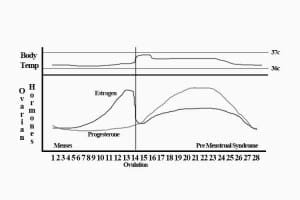
This phenomenon can make it look like a woman isn’t losing weight. But it’s simply water shifts across the month masking actual progress. It goes without saying, but I’ll say it anyway, that I discuss this in detail in The Women’s Book Volume 1.
Other Actual Reasons
And that’s just a sampling of the actual research and reality based reasons you’re not losing weight. Like with the myths, there are others but the above tend to be the big ones in my experience.
And they are the ones that fitness “professionals” should be educating you about rather than calling you an asshole for not knowing what you don’t know. Because as professionals, or even active people who want to see people be healthy, you should either be helpful or shut the fuck up.
This is your obsession, or your career. Rather than being a judgemental prick because someone has been misled by endless bullshit, EDUCATE them. Start by showing them my graphic.
So Here’s My Graphic
So here’s the full size version of the graphic I put together. Please feel free to download it and share it. It will hopefully do a fuckload more good than the one calling people an asshole for not knowing what they can’t possible know.
Do note, it has my logo on it. And it is COPYRIGHTED.
You can download it, share it, etc. But if you do, leave my logo and name on it. I will know.
So there you go folks.
The Real Reasons You’re Not Losing Weight
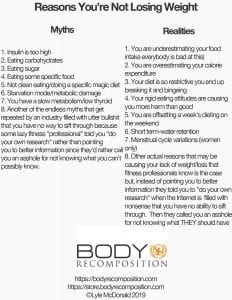
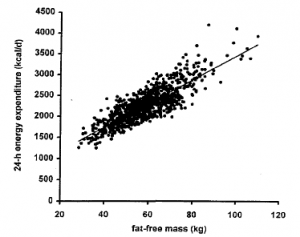
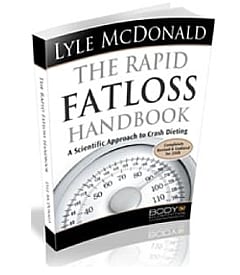
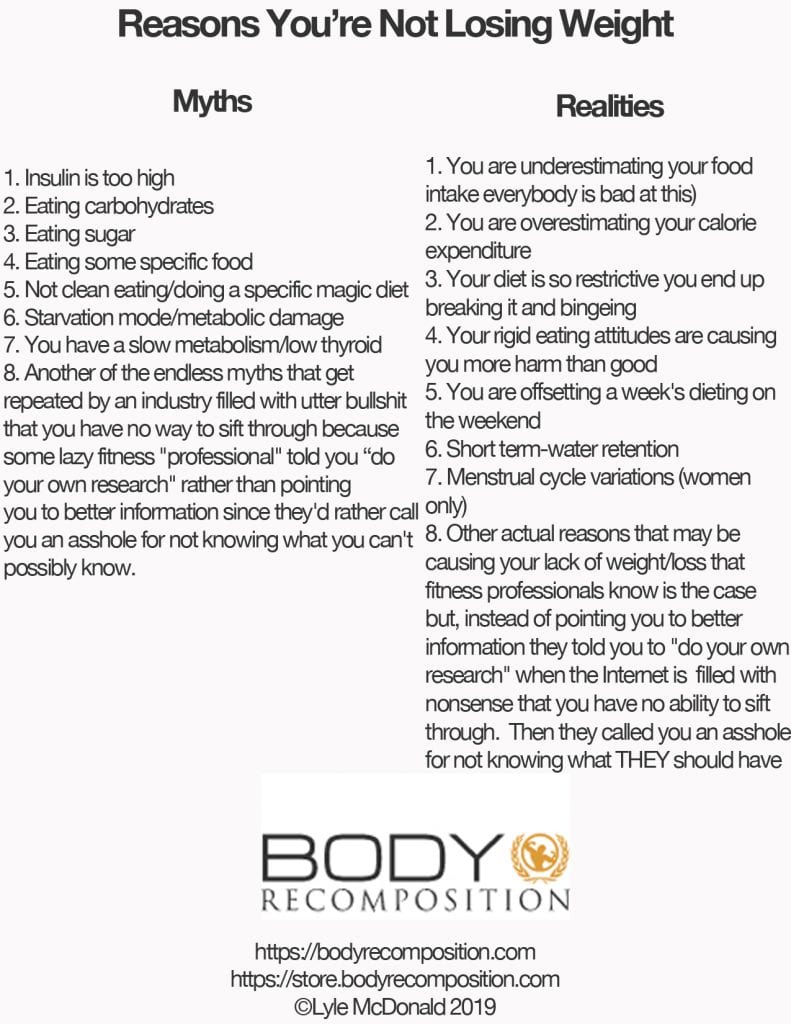
Facebook Comments